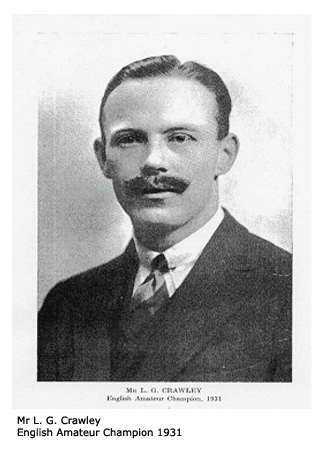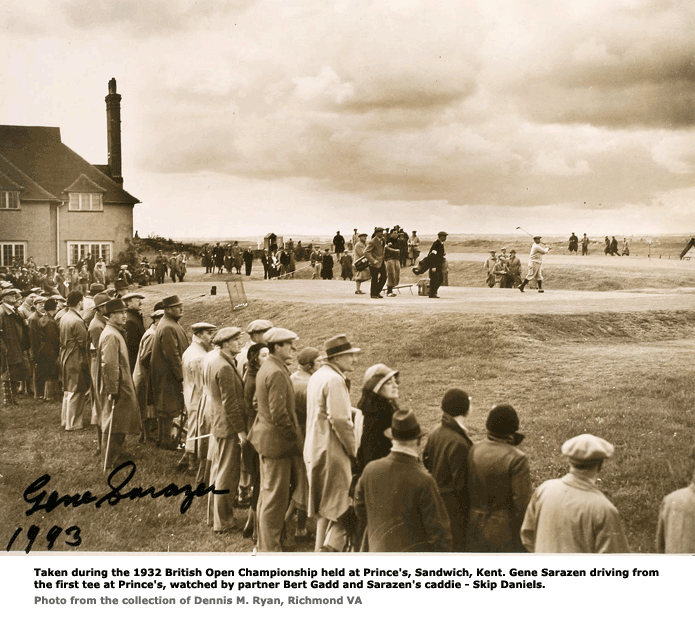|
12-handicapper, best known in horse racing circles, as a very
enthusiastic golfer who would often tee off before 8.30am attired in
white cricket shirt and flannels that “looked as if they were only
held up by a miracle”. He recalled that his partner, one of the
world’s wealthiest men, never played for more than half a crown and
never gave a putt. Harry “found it best not to beat him by too much,
and not until the last hole!” but he still managed to save enough
from his winnings and tips to buy a motorbike.
(In 1938 the Aga Khan was to be elected to the R&A).
Following my eventful introduction to the Open Championship there
was plenty to talk about on our return trip to Birmingham and Jack
Mitchley was not looking forward to ‘facing the music’. I never
found out how he explained the damaged wheel, but it must have been
convincing for his Dad never mentioned the incident to me and Jack
still had use of the car.
My performance in the Midland Professional Championship qualified me
for the News of the World £1040 Matchplay championship at Moor Park.
I progressed to the 2nd round, before losing to Ryder Cup player
Herbert Jolly. Another two Ryder Cup players contested the final,
Henry Cotton, then at Langley Park in Kent and Alfred Perry, a
powerful fair-haired player from Leatherhead. Perry had impressed at
the previous year’s Roehampton Tournament where he had recorded two
68s; the course record before it was later lowered to 67 by my
brother Charles. Cotton won the 36-hole match by 10 & 8. It was the
first of three victories in the event for one of Britain’s greatest
players. His winner’s
 cheque was three times bigger than the one
received by Sarazan at Prince’s, although that was irrelevant to
Henry; it was the Claret Jug that he wanted to get his hands on; The
Open winner now received £100, but the News of the World had put
their first prize up to £300 plus a ‘large gold medal’. For reaching
the second round I received £10 and a ‘small silver medal’. cheque was three times bigger than the one
received by Sarazan at Prince’s, although that was irrelevant to
Henry; it was the Claret Jug that he wanted to get his hands on; The
Open winner now received £100, but the News of the World had put
their first prize up to £300 plus a ‘large gold medal’. For reaching
the second round I received £10 and a ‘small silver medal’.
Great Britain and Ireland lost the seventh Walker Cup match that
year by 9 ½ to 2 ½ and were still waiting for their first victory.
The match was played in the USA at the Country Club, Brookline,
referred to as the ‘Bear Pit’ in a book by European captain, Mark
James, after the controversial Ryder Cup match played there in 1999.
The more gentlemanly encounter of 1932 saw the eventful debut of L.
G. Crawley of Brancepeth Castle, who had been absent from the Open
that year, having recently established the Warriston Prep School
near Moffat in the Scottish borders and appointed himself
headmaster. (His career as a golf correspondent began after the
war.)
L. G. made a lasting mark on the Walker cup - He recorded the team’s
solitary victory and put a dent in the trophy with his wayward
approach at the 18th hole.

NEXT |

 cheque was three times bigger than the one
received by Sarazan at Prince’s, although that was irrelevant to
Henry; it was the Claret Jug that he wanted to get his hands on; The
Open winner now received £100, but the News of the World had put
their first prize up to £300 plus a ‘large gold medal’. For reaching
the second round I received £10 and a ‘small silver medal’.
cheque was three times bigger than the one
received by Sarazan at Prince’s, although that was irrelevant to
Henry; it was the Claret Jug that he wanted to get his hands on; The
Open winner now received £100, but the News of the World had put
their first prize up to £300 plus a ‘large gold medal’. For reaching
the second round I received £10 and a ‘small silver medal’. 